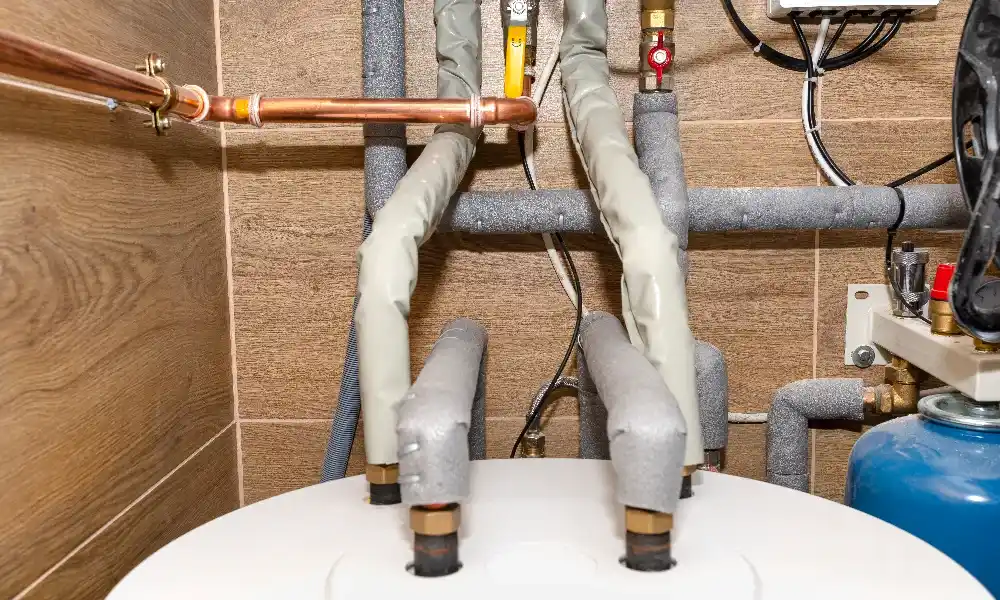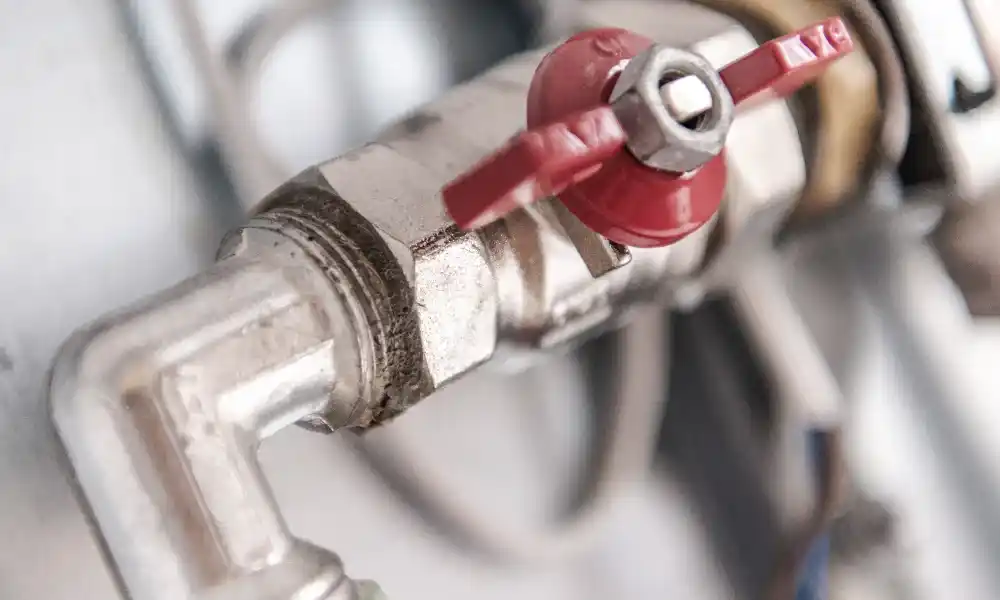
No homeowner wants to deal with a sewer problem, especially when it turns out to be a collapse. It’s more than just a foul smell or a slow drain—it’s a serious plumbing emergency. If left untreated, a collapsed sewer line can result in significant property damage and pose potential health risks.
While it might be tempting to brush it off as “just a few drops,” water leaking from overflow pipe on water heater could point to pressure issues, worn-out components, or even overheating. Let’s break it down, figure out what’s going wrong, and see what you can do about it.
What Is a Water Heater Overflow Pipe?
Is that small pipe running down the side of your water heater? That’s the overflow pipe. It plays a critical safety role in your water heater system.
Why Does a Water Heater Need an Overflow Pipe?
The overflow pipe is attached to the Temperature and Pressure Relief (T&P) valve. It prevents your tank from building up dangerous levels of pressure or heat. When either temperature or pressure gets too high, the valve opens, allowing excess water to escape safely through the water heater overflow pipe.
How the Overflow Pipe Works in a Water Heater System
This pipe directs hot water away from the tank and down to the floor or drain when needed. It prevents explosions or severe damage. But if the water heater overflow pipe leaking is constantly, that safety mechanism might be warning you of something more serious.
Why Is My Water Heater Overflow Pipe Leaking?
The sight of your water heater overflow dripping can be frustrating, but it’s usually trying to tell you something important.
Excessive Pressure Build-Up in the Tank
Water expands as it heats. If the pressure inside the tank increases too much, the T&P valve will open to relieve it. When this happens often, it results in water leaking from overflow pipe on water heater consistently.
Faulty Temperature and Pressure Relief (T&P) Valve
Sometimes, the valve itself is the problem. A faulty or old valve might leak even when the tank isn’t under high pressure. This can make it seem like your water heater overflow pipe leaking all the time for no reason.
Water Temperature Set Too High
If your thermostat is set too high, your water will overheat regularly. That causes pressure to spike and makes the water heater overflow pipe release hot water frequently. It’s dangerous and wasteful.
Thermal Expansion Without an Expansion Tank
Without a thermal expansion tank, your plumbing has nowhere to handle the expanding water. This forces the T&P valve to release pressure more often than it should. Result? Water heater overflow dripping becomes a regular problem.
Sediment Build-Up Inside the Tank
Over time, sediment collects at the bottom of your tank. This buildup traps heat, resulting in irregular temperature fluctuations. The result is pressure fluctuations that can lead to your water heater overflow pipe leaking.
Corroded or Damaged Pipe or Valve Components
Wear and tear happen. Corroded pipes or cracked valves won’t seal properly. That means water might escape even when pressure and temperature are within safe ranges.
Is It Normal for Water to Come Out of the Overflow Pipe?
Sometimes, yes. But it depends on how often and how much.
Normal Situations Where Overflow May Occur
Routine Pressure Relief Function
The system is working as intended. A small amount of discharge from time to time is normal.

Initial Heating Cycle After Installation
Your heater may release some water during its first complete cycle to balance pressure.
Slight Drips After Fluctuations in Water Temperature
Minor drips during cold snaps or after heavy usage can be regular.
When It’s a Sign of a Problem
Constant or Heavy Dripping
If you’re seeing a steady stream, that’s not normal. It means something’s wrong inside the system.
Water Puddling Around the Base of the Heater
Leaks that pool around your tank need immediate attention. Mold and water damage aren’t far behind.
Signs of Corrosion on the Valve or Pipe
Rust around your water heater overflow pipe or valve is a red flag. It indicates long-term leaks and potential failure.
Rusty or Discolored Water Leaks
If the water coming out is brown or contains sediment, it may indicate tank corrosion or mineral buildup.
How Do You Stop a Hot Water Heater From Leaking Overflow?
Let’s get hands-on. You can address this issue with the steps below.
1. Turn Off the Power Supply
Cut power to the heater—electric at the breaker or gas at the shut-off valve.
2. Shut Off the Cold Water Inlet Valve
This stops water from entering the tank while you inspect or repair it.
3. Check the Temperature Setting
Ensure the thermostat is set between 120°F and 130°F. Anything higher risks overheating.
4. Inspect and Test the T&P Valve
Lift the valve’s lever briefly and let it snap back. If it continues to leak or fails to release water, it may not be very accurate.
5. Drain and Flush the Tank to Remove Sediment
Connect a hose to the drain valve. Empty the tank, then refill. This clears the sediment that might be causing overheating.
6. Install an Expansion Tank If Needed
An expansion tank absorbs extra pressure caused by heated water, reducing reliance on the overflow system.
7. Replace the T&P Valve If Faulty
If testing proves the valve is damaged or constantly leaking, replace it with a new one.
Is a Leaking Overflow Pipe an Emergency?
It depends on the severity and cause.
When It’s a Minor Issue
A few drops now and then may not require urgent attention, but they should still be monitored.
When It Requires Immediate Professional Help
Fast Water Flow or Constant Leaks
If water gushes from the pipe, shut off the unit and call a plumber right away.
Visible Corrosion or Damage
Don’t ignore rust, bulging, or broken parts near the valve or pipe.
Signs of Tank Overheating or Swelling
These are serious safety hazards and demand emergency repair.
Electrical Connections Near Water Source
If water is leaking near outlets or wires, turn off the power immediately.
How to Prevent Future Leaks in Your Water Heater Overflow Pipe
Prevention saves money, stress, and water damage.
Test the T&P Valve Every 6 Months
Lift the valve tab and check for smooth operation. If it sticks or leaks, replace it.
Drain and Flush the Tank Annually
This prevents sediment from accumulating and causing pressure issues.
Monitor Temperature Settings Regularly
Make sure the water isn’t heating too high. Check settings monthly.
Install a Thermal Expansion Tank If Needed
It helps manage pressure changes and reduces stress on the T&P valve.
Call Wally Blanton Plumbing & Sewer for Hot Water Heater Repair in Antioch, IL
A water heater overflow pipe leaking can go from a nuisance to a significant issue fast. Whether you’re seeing water leaking from overflow pipe on water heater once a month or experiencing water heater overflow dripping every day, the problem won’t fix itself.
From minor temperature adjustments to full valve replacements, you need someone who knows the system inside and out.
That’s where Wally Blanton Plumbing & Sewer comes in. With expert service and fast response in Antioch, IL, we’re your go-to team for all things water heaters. Don’t wait for the damage to spread. Contact Wally Blanton Plumbing & Sewer today to schedule your repair and get peace of mind.
